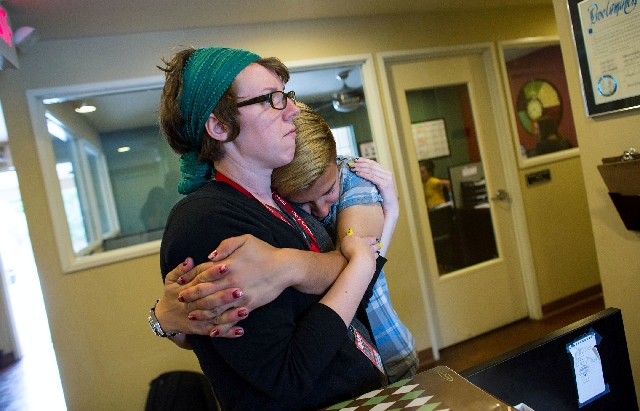Gay teens swell ranks of Clark County’s homeless youth
Julio Chavez feared for his life. That was on the night last year when he landed on the streets of Las Vegas with no place to go. Then 18, he was kicked out by relatives after having arrived in Sin City just three days earlier.
He had left his hometown of New Oxford, Pa., where he lived with his mother because he didn’t feel accepted.
“I wanted to get away from the town because it’s not as open-minded,” Chavez said Thursday, glancing at his glittery red nails. “It really didn’t accept me for who I was.”
Chavez is among an estimated 15 percent of homeless youth in Clark County who are lesbian, gay, bisexual or transgender. That percentage is based on the 300 clients that the Nevada Partnership for Homeless Youth in Las Vegas served through its core programs last year, said Arash Ghafoori, executive director at the nonprofit.
They range in age from 15 to 19.
The nonprofit serves children and teens who are homeless because they are fleeing an abusive environment, are neglected or are experiencing issues related to their sexual orientation, among other reasons, said Melissa Jacobowitz, development specialist with the organization.
Nonprofit officials say the number of gay homeless youth in Clark County could be higher.
Nearly 6,000 homeless youth are enrolled in the Clark County School District, according to the Nevada Partnership for Homeless Youth.
Nevada is one of five states with the highest number of homeless youth, according to the nonprofit’s statistics and the National Center on Family Homelessness.
The Nevada Partnership for Homeless Youth has seen an increase in gay homeless youth, Ghafoori said.
That is not unique to the area, but rather a national trend.
About 40 percent of homeless youth nationwide are thought to be gay, bisexual or transgender, according to a 2012 study by the Williams Institute, a national think thank at the University of California, Los Angeles School of Law.
“The majority of them are running away from home or getting kicked out because of their sexual orientation,” Jacobowitz said.
Nearly seven in 10 homeless juveniles who fall in that same category have experienced family rejection, the Williams Institute study found.
They are leaving their homes at a younger age because they feel more comfortable coming out of the closet as sexual orientation issues receive more attention nationwide, Jacobowitz said.
“They are coming out younger, so they are getting kicked out younger,” she added.
Ghafoori said he follows the issue closely so his agency is better equipped to deal with it.
“This is definitely not a hate zone,” he said. “This is a totally safe environment for any youth to access, including LGBT. We don’t discriminate.”
The nonprofit is working with partners to compile data dealing with gay homeless youth, he said.
It’s hard for teens to admit that they are homeless and even harder for them to acknowledge they are gay, Jacobowitz said.
Chavez, who has been homeless for 11 months, said an uncle bought his ticket to Las Vegas. He also was searching for his father, who divorced his mother when he was a young child.
Chavez got in touch with relatives in Las Vegas who sounded like “they accepted” him.
Three days later, his relatives kicked him out of their house.
Chavez found shelter his first day on the street at the McDonald’s on Tropicana Avenue and Topaz Street. He got kicked out when the fast-food restaurant closed for the day.
“For me, it was terrifying,” he recalled.
The next day, he connected with the Nevada Partnership for Homeless Youth.
“It gave me a new perspective in life,” Chavez said. “I found a new family. They are like my brothers and cousins.”
On top of the challenges that Chavez has faced, he also is undocumented, making it harder for him to find work.
However, he is focusing on what he can accomplish.
On June 15, he will graduate from Beacon Academy, an online high school. He plans to attend the College of Southern Nevada and then transfer to the University of Nevada, Las Vegas to major in social work.
“I feel like the youth are the ones who need help the most,” he said.
Contact Yesenia Amaro at yamaro@reviewjournal.com or 702-383-0440.



















